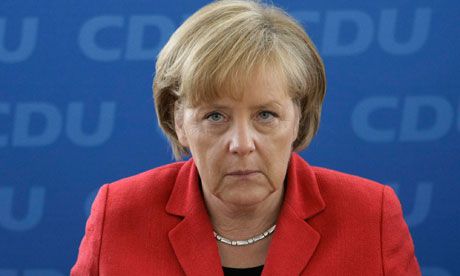Wie sieht ein deutscher Kollege deutsche Krisenrhetorik, fragte der Guardian. Well, here's my two pennies' worth...
Domestic politics are driving Germany's response to the euro crisis and Greek debt, but the chancellor may pay dearly for it
Sometimes, world politics and domestic issues don't go together too well in Germany. The Greek debt crisis turned possible crash of the euro is just another example.
When Standard & Poor's downgraded Greece's bonds to junk status on Tuesday afternoon, Chancellor Angela Merkel was in the city of Bocholt. A medium-sized town with about 70,000 inhabitants, it might appear as a somewhat strange place to be at a time of crisis for the head of government of Europe's biggest economy.
But Bocholt belongs to the state of North Rhine Westphalia, Germany's most populous state, where Merkel's Christian Democrats are facing a regional election on 9 May. It became most obvious that the regional election campaign was on Merkel's mind when she reacted to the crisis in Greece.
After days and days of hesitation and apparent indecision, when speaking to the audience at the rally in Bocholt, Merkel played the populist card. We're right to tell the Greeks: you have to save money, you have to be candid and you have to work on your honesty, otherwise we can't help you, Merkel said.
It's one thing to ask Greece for strict austerity measures in return for a bailout deal. But when Merkel implicitly said that the Greeks weren't honest and had poured money down the drain, she didn't ask for anything. She didn't even try to calm the fear among Germans that contributing billions to the Greek bailout will lead to further wage cuts and tax freezes.
Merkel simply reacted to anti-Greek prejudices apparently shared by great numbers in Germany these days, strongly supported by Germany's biggest tabloid, Bild. "You Greeks are getting nothing from us," headlines say. When young policymakers of Merkel's Christian Democrat and Liberal coalition in a newspaper article asked Greece to sell a few of their islands to solve the problem, it was only the beginning of a series of rather unhelpful proposals.
Such reactions to the crisis are worrying. According to their rhetoric, German politicians don't seem to realise what's at stake. With Greece shattered and Portugal and Spain at risk, they still imply that, in order to tackle the crisis, the lazy Greeks simply had to bite the bullet.
This might help to win a regional election. It just might not be enough to prevent the breakup of the European currency.
With more than half of Germans against helping to support Greece, explaining the need for help is no easy task. But there's hope. German lawmakers said IMF chief Dominique Strauss-Kahn told Merkel that the aid package would be worth €100-120bn over three years. And Merkel promised that Germany will bear its responsibility.
As for the compatibility of world politics and German domestic issues, Merkel should keep in mind that her predecessor also leered at the voters' sentiment a little too much once, at the time of an international crisis. Gerhard Schröder's "no" to the US invasion in Iraq helped him win the parliamentary elections 2002. And one might agree with him on the matter. But his anti-American undertone alienated Germany and the US from each other - and his rigorous refusal didn't help unify the European countries either.


